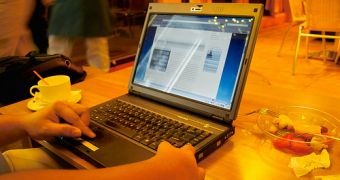Pro-copyright lobbyists backed by old media-content companies, meaning mostly movie studios and record labels, are trying to change copyright law all over the world in order to prop up their obsolete business models. And just because they don't get any luck on the web, they want to make sure the experience is just as miserable for the rest of us. The latest example is the attempt to outlaw public Wi-Fi's in the UK lest they become a haven for hardened criminals like p2p users.
Tucked away in the hotly disputed Digital Economy Bill (DEB), which is filled with controversial measures not the least of which is the provision to disconnect repeated illegal file-sharing offenders, the so-called 'three-strikes' rule is another measure that defies common sense, will hurt businesses and regular people alike, but has media execs rubbing their hands in joyous anticipation.
According to official advice released last week, small businesses, universities and even libraries won't be exempted from the provisions of the DEB, which basically makes ISPs responsible for what their users download or upload or at least for regulating that. This means that, if someone were to download Avatar from a BitTorrent site by using a free Wi-Fi connection offered by a local pub, a very likely thing to happen, the pub in question would be liable for the crime.
If this goes through, most cafes and other small establishments offering free Internet connections to lure in customers would have to stop, since the alternative, setting up a system that registers and tracks all the users, is not only highly impracticable, but also prohibitively expensive. So, no more free Internet.
The misguided logic behind the move is that, if these operators were allowed to offer open Wi-Fi and not be liable for any presumable infringements, it would create a loop-hole in the system, which merciless pirates would abuse to get their kicks.
Anyone with a modicum of tech literacy or just plain common sense, in fact, anyone who has ever used a free Wi-Fi connection realizes how out-of-touch these media-industry people must be if they imagine anyone is going to spend two hours at a coffee shop sharing a 2 Mbps connection with 20 other people to get the latest Lady Gaga album. They'd probably spend more on the coffee than they would buying the album from iTunes or, better yet, buying a Spotify premium account. [via ZDnet]

 14 DAY TRIAL //
14 DAY TRIAL //